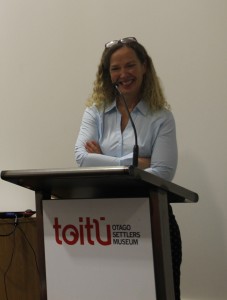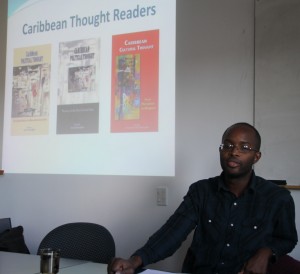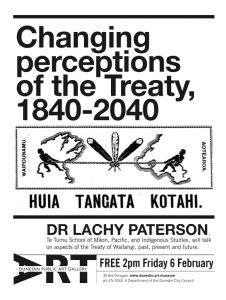Hocken Lecture
The Centre is delighted to hear that this year’s Hocken Lecture will be given by Professor Tony Ballantyne, the Centre’s director and the Head of the Department of History and Art History at the University of Otago. He will talk on ‘Archives, Public Memory and the Work of History’ in the Burns 1 Lecture Theatre, 95 Albany Street, on 6 August, beginning at 5.30pm. This is a free event and all are welcome.
Finding India in Dunedin
Dr Jane McCabe will give a talk today on Dunedin’s Indian connections, specifically Kalimpong, where Dr. Graham operated an orphanage for Anglo-Indian children. Some of these children were sent to Dunedin in the early decades of the twentieth century. In the afternoon’s talk Jane will discuss the pathways and fate of these children once in New Zealand. Everyone is welcome to attend this free public event, which begins at 2pm in Toitu’s Auditorium.
Queer Domesticities: taking queer history indoors
The Centre is delighted to be hosting Matt Cook, Professor of Modern History at Birkbeck College, University of London, who will give a public lecture based on his latest book at the University of Otago this week. He will discuss his latest book, Queer Domesticities: homosexuality and home life in twentieth century London, to make a case for the importance of domestic space in the making of queer – and here queer male – desires and relationships.
Professor Cook’s lecture will take place in Burns 2 Lecture Theatre (in the Arts Building, 95 Albany Street), on Wednesday 1 July, beginning at 5.15.
This is a free event and all are welcome to attend.
Hope to see you there!
Dunedin’s Genetic Inheritance and Caribbean Cultural Thought.
The Centre has recently hosted two riveting research-based talks.
The first, on Sunday 10 May, was part of the Centre’s ongoing project, Global Dunedin. Professor Lisa Matisoo-Smith, a biological anthropologist from Genetics Otago gave a public lecture at Toitū: Otago Settlers Museum, “Who do you think you are – Dunedin?”
Lisa discussed the genetic ancestry of Dunedin’s population based on the testing of randomly selected DNA samples. This research is part of the “Africa to Aotearoa” project, in which Lisa looks at the deep ancestry of New Zealanders, which in turn is part of a wider international study, the Genographic project, funded in part by National Geographic. While one might suspect that Dunedin’s genetic make-up is essentially homogenous from its Scottish heritage, the research shows just how diverse Dunedin’s population is, in line with other major cities in New Zealand.
On Thursday, May 15 visiting scholar Dr Aaron Kamugisha gave a CRoCC seminar, “The Caribbean’s Intellectual History through Culture”. Aaron discussed the global impact of Caribbean theorist’s, particularly CLR James, amongst others, on the development and dissemination of anti-colonial thought and intellectual traditions. He placed these theorists in the context of the development of two threads of intellectual history: Caribbean Studies and Caribbean Cultural Studies, but argued that these thinkers ought to be understood in term of Caribbean radical thought.
Who Do You Think You Are – Dunedin?
The next lecture in the Centre for Research on Colonial Culture’s ‘Global Dunedin’ initiative will be given by Professor Lisa Matisoo-Smith who will detail some cutting edge research on the deep ancestry of Dunedinites from her “Africa to Aotearoa” project, which looks at the ancestry of New Zealanders. As part of this project over 200 samples were collected from across the population of Dunedin. So who do you think you are, Dunedin? What does the genetic ancestry of Dunedin look like compared to Wellington, or Christchurch or Auckland? What does it tell us about the history of Dunedin?
Lisa’s lecture will take place on Sunday 10th May 2015 at 2:00pm at Toitu Otago Settlers Museum – Auditorium.
And don’t forget to ‘like’ Global Dunedin on Facebook and follow the blog.
Dunedin Sound
The first ‘Global Dunedin’ public lecture takes place on Sunday 12 April.
Join us at 2pm in the Auditorium at Toitū Otago Settlers Museum to hear Dr Graeme Downes – from the University’s Department of Music and the renowned frontman of the Verlaines – talking about Dunedin music, particularly in light of the very successful Tally Ho! collaboration with the Southern Sinfonia.
Please come along!!
Waitangi Day Talk
Followers of the Centre may be interested in attending a forthcoming public talk to be given by Dr. Lachy Paterson on 6 February at the Dunedin Public Art Gallery. Lachy will be discussing changing views of the Treaty of Waitangi, since 1840 and up to the present day. He will also reflect upon the Treaty’s role in New Zealand society currently and in the future. The talk begins at 2pm. Read more about it here.
Scots and Indigenous Peoples
We are delighted to announce that Professor Ann Curthoys is giving a free public lecture entitled “Scots and Indigenous Peoples in the Australian Colonies” on Monday 24 November in Castle Lecture Theatre 1 at 3.30. Professor Curthoy’s lecture also doubles as the opening keynote address for the Migrant Cross-Cultural Encounters Conference (24-26 November) being co-convened by the Centre for Research on Colonial Culture, the Centre for Irish and Scottish Studies, the Asian Migrations research theme, and the Cross-Cultural Comparative Studies research theme.
Professor Curthoys is one of Australia’s most respected historians. She is an Honorary Professor at the University of Sydney, and a member of the Australian Academy of the Humanities and the Academy of Social Sciences in Australia. In 2013, she was awarded the History Council of New South Wales Annual History Citation that recognises and honours an individual who has made a significant and lifelong contribution to the profession and practice of history. She was formerly an Australian Research Council Professorial Fellow at the University of Sydney (2008-13) and Manning Clark Professor of History at the Australian National University (1996-2008). She has written widely on questions of Aboriginal history, genocide theory, and race relations in colonial and modern Australia. Her current research focuses on Indigenous-settler relations in the Australian colonies. As part of her ongoing research on the British Empire, settler self-government, and Indigenous peoples, she has a particular interest in Scottish-Indigenous relations in the mid nineteenth century, and it is this aspect of her research that she will detail in her public lecture.
She has provided the following abstract:
We can tell the history of Scottish migration to colonial Australia in several very different ways. We might emphasise a generally positive history of struggle and achievement as Scots migrated from one end of the world to another. Or we might narrate a tragic history of Aboriginal dispossession, displacement and replacement in the face of European settlement, a story of violence and great loss of life, and sometimes the destruction of whole societies as settlers fought to secure their hold on the land. Though these two stories are usually told separately, they are, of course, connected – Scots and Aboriginal people encountered one another constantly, and Scottish upward mobility was built on Aboriginal dispossession. Though the task is challenging and difficult, it is worth considering both Scottish diaspora and Indigenous histories together, for when we do, we can better understand some of the complexities of empire and colonisation in the nineteenth century. A focus on Scots can help us deconstruct the categories ‘British’ and ‘settler’, and foreground in new ways the connections between immigrants’ origins and background (in political, cultural, economic, and social terms) and their cross-cultural interactions in the colonies.
In this paper, I discuss the cross-cultural encounters between Scots and Aboriginal people in Australia from the mid 1830s to the mid 1870s. This was the period when a set of struggling British colonies – mostly dependent on convict labour, covering relatively small regions of settlement, and under direct British rule – were transforming into free self-governing democratic colonies dominating vast regions of the continent. While some areas were still experiencing intense frontier conflict and violence, in others the violence had largely ended and a post-frontier society, involving new settler-Indigenous relationships, was emerging. The Scots I consider included both pastoralists and their critics, such as journalists, politicians, amateur ethnographers, and men of the church, and the Indigenous peoples they met are those whose country lay in the two Australian colonies named after Queen Victoria – Victoria and Queensland.
Forthcoming Talks
The Centre is hosting an informal research seminar on ‘Revolutions and Empires in the South-West Indian Ocean, 1788-1810’ by Dr Sujit Sivasundaram (University of Cambridge), on Thursday 6 November, at 2pm, 2N8 (History Department Seminar Room) in the Arts Building.
CROCC is also sponsoring a public lecture by Professor A.G. Hopkins, (University of Cambridge) entitled, ‘Is Globalisation Yesterday’s News?’. This will be held on Monday, 10 November 2014 at 5:15pm in the Moot Court, Level 10, Richardson Building. Professor Hopkins is one of the leading economic historians of his generation and he has produced authoritative works on West African economic history (An Economic History of West Africa (1973)), the economics of British imperialism (the landmark two-volume British Imperialism co-authored with Peter Cain) and was one of the first historians to grapple with the analytical possibilities of globalisation (editing both Globalization in World History (2002) and Global History: Interactions between the Universal and the Local (2006)). Professor Hopkins has provided the following abstract, which suggests it should be an engaging lecture:
Globalization envelopes the world – and historians too. The ‘g’ word is now mandatory in titles of books and articles; Ph.D. students follow their leaders in dedicating their dissertations to the subject. Yet, not so long ago postmodern approaches to the past were equally compelling: if you could not tell your trope from your alterity and your Spivak from your Bhaba, your chances of landing a job were minimal. Wise investors buy at the bottom of the market and get out at the top. So, it is worth asking whether shares in globalization have further to run or whether full value is already in the market. One way of answering this question is by considering the reasons why historiographical phases, like empires, rise, flourish, and decline. This approach provides pointers to the current state of globalization studies and offers an estimate of the current value of the shares. The advice comes with a wealth warning: past performance has limited predictive power. As a famous trumpeter remarked when asked which way jazz was going: ‘man, if I knew which way jazz was going, I would be there already!’
Professor Henry Reynolds in Dunedin
 On Monday 22 September prominent Australian historian, prize-winning author and public intellectual, Professor Henry Reynolds (University of Tasmania), will deliver the inaugural Archibald Baxter Memorial Peace Lecture.
On Monday 22 September prominent Australian historian, prize-winning author and public intellectual, Professor Henry Reynolds (University of Tasmania), will deliver the inaugural Archibald Baxter Memorial Peace Lecture.
This public lecture has been established by the University of Otago’s National Centre for Peace and Conflict Studies. The lecture is titled ‘Discovering Archibald Baxter and the thoughts on war which followed’ and will take place in Archway 1 at 5pm. This is a free event and is open to the public.




